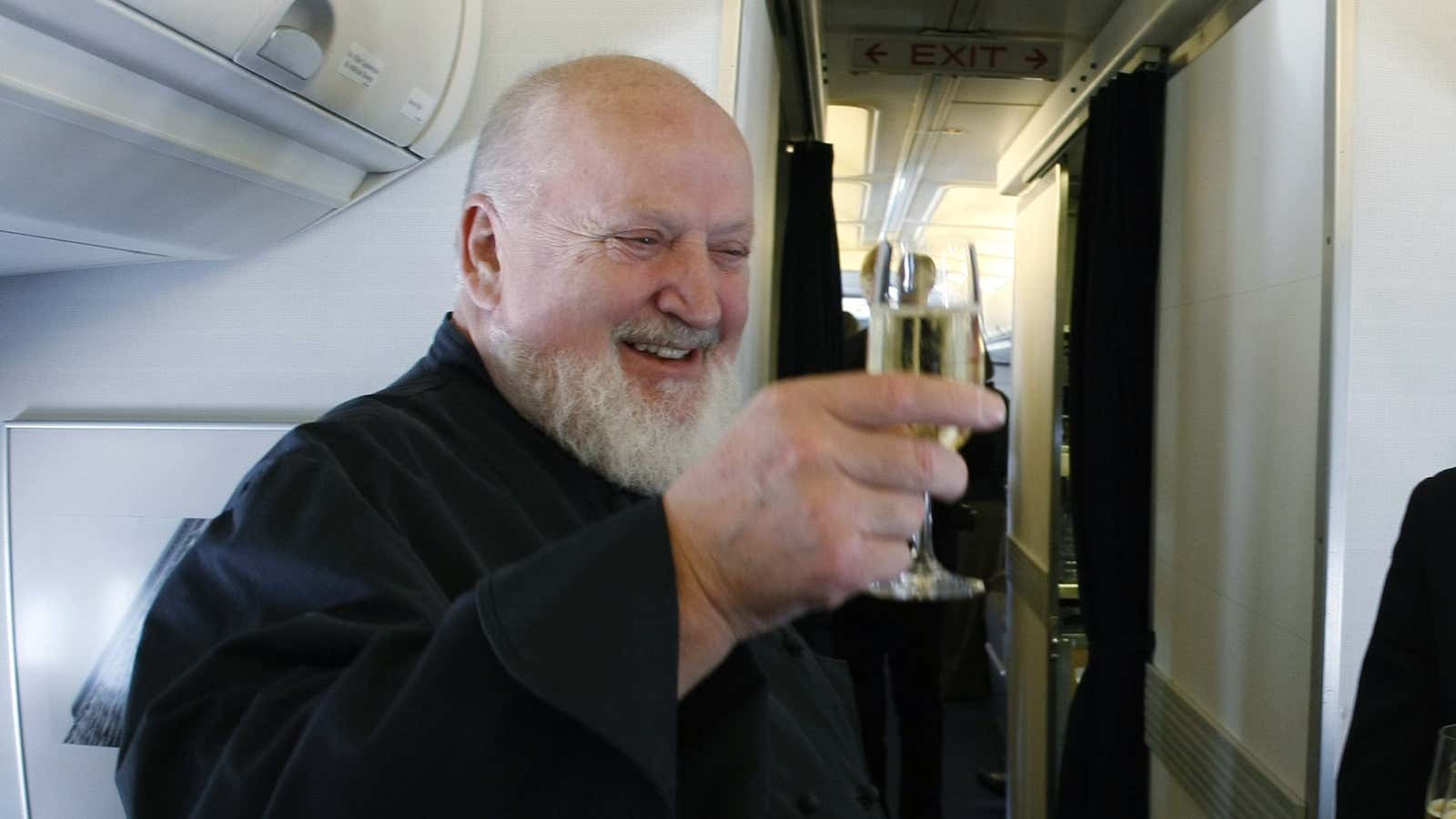Just because it looks like an egg doesn’t mean it will taste like an egg.
This sweet culinary joke made of apricot “yolks” swimming in luscious cream will be familiar to foodies, who are mourning the loss of celebrated chef Michel Richard. The jovial French chef passed away at age 68 on Saturday, Aug 14. He will be remembered not just for his award-winning restaurants, but for his creativity and perseverance, even at the height of his career.
In 1994, at age 50, Richard grew tired of Los Angeles’ fussy, calorie-counting patrons, and upended his career by moving to Washington, DC to start anew. It was a wise choice: With his embrace of novelty and wit, he quickly transformed the US capital into a “capital of dining.” At his now-legendary restaurant Citronelle, Richard delighted DC diners with playful sleights of hand: scallops presented like delicate scrambled eggs; raspberries and almonds pressed together to look like salami or his elevated version of the Kit Kat chocolate bar.
While many chefs tend to sink into the plush of their Michelin stars, James Beard medals and crowd-pleasing classic dishes, Richard was known to often stay late at in the kitchen, joyfully scheming new surprises for his regular diners. He documented his philosophy of novelty in his 2006 cookbook Happy in the Kitchen: Loose, MacGyver-esque experimentation with flavors and forms, done with the most impeccable French technique. “In cooking, as in love, you always have to try new things to keep it interesting,” Richard writes.
When one of those unusual plates arrived, world-weary diners suddenly became conscious of what they were eating. As LA Times food columnist Russ Parsons wrote in 2006:
The ‘hard-boiled egg’ was really a tomato salad in disguise—the white was mozzarella curd and the yolk a yellow tomato gelee—the familiar flavors presented in a form that made you consider them anew…It was a splendid goof, but a goof with a point—several actually.”
(Richard had many variations on the sunny side up egg. He demonstrates one of these “egg-ceptional” recipes, as he called them, in Julia Child’s cooking show in 1996.)
Richard, who immigrated to the US in the 1970’s, meshed with the scrappy inventiveness of American culture. His baker, Mark Furstenberg, recalls Richard’s love of unusual tools and As-Seen-on-TV gadgets that he repurposed as kitchen tools. “He watched infomercials on television, the contraptions they were selling. Often he would imagine a food use for them, a new idea, a new dish,” writes Furstenberg on his blog.
Before Ferran Adrià’s elaborate gastronomic experiments at Spain’s El Bulli, Richard was already toying with PVC pipes, poaching in plastic bags and messing with liquid nitrogen in his comparatively modest laboratory. Furstenberg writes:
Often he arrived early in the morning and could spend an entire day, sometimes more than a day, inventing a new dish or a new technique for cooking. He was perpetually excited about his work always trying something new and different, a bright orange carrot mousse atop a bright green liquid made from carrot tops, a cloud of nitrogen to dazzle my 96 year old mother before serving to her the ice cream he had made for her.
While Richard’s creativity was unquestionable, he suffered many losses in business. Described by writer Mark Bitman as “a joyful character, perhaps a lousy businessman,” in a tribute, Richard overextended his “brand” by taking on too many projects and opening too many branches all over the US. It turned out that the most critical ingredient to Richard’s success was his presence and regular improvisation—qualities that couldn’t be reliably exported to far-off branches.
His restaurants in Las Vegas, Los Angeles, Baltimore, Philadelphia, Tokyo and New York were decimated by critics and eventually all of them closed except for the Citronelle in Washington, DC. (He opened a bistro nearby called Central in 2004 and Citronelle permanently closed in 2012).
But Richard’s legacy lives in the legions of chefs and home cooks he nourished with his joyful and humorous approach to work and life.
https://www.instagram.com/p/BJDy_3pAgPq/?tagged=michelrichard




